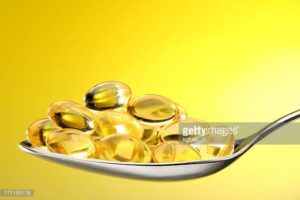
Diagnosed with Cancer? Your two greatest challenges are understanding cancer and understanding possible side effects from chemo and radiation. Knowledge is Power!
Learn about conventional, complementary, and integrative therapies.
Dealing with treatment side effects? Learn about evidence-based therapies to alleviate your symptoms.
Click the orange button to the right to learn more.
- You are here:
- Home »
- Blog »
- Healthy Living Products »
- Omega 3, Breast Cancer Risk in the VITAL Cohort.
Omega 3, Breast Cancer Risk in the VITAL Cohort.

“Fish oil may be inversely associated with breast cancer risk. Impact: Fish oil is a potential candidate for chemoprevention studies.”
Fish Oil was shown to be related in some way to a percentage decrease in invasive ductal breast carcinoma in a group of 35,000 post-menopausal women who completed a 24-page questionnaire between 2000 and 2002 regarding their current and past use of various supplements including fish oil. Those taking fish oil at the beginning of the study and continuing had approximately half the incidence of breast cancer. The other supplements did not appear to have a relationship to risk for breast cancer.
According to the U.S. News article listed below
Fish Oil May Fight Breast Cancer
“researchers at Harvard Medical School are now beginning a five-year randomized trial of 20,000 people to examine the effects of fish oil and vitamin D on the risks of cancer, heart disease, and other ills.”
The research article does not recommend that individuals take fish oil to prevent ductal breast cancer, but these results are encouraging. Personally, I take fish oil daily and will continue to do so. I also take Co-Q10 and probiotics, but not as a cancer preventative.
I am always curious about exactly which form of the supplements the people who are reporting in these types of non-randomized studies are taking and how we can be certain of the accuracy of their recollections. The other supplements which were not seen to be related to breast cancer incidence were glucosamine, chondroitin, grapeseed, black cohosh, soy, dong quai, St. John’s wort, coenzyme Q10, garlic pills, ginkgo biloba, ginseng, melatonin, acidophilus, and methylsulfonylmethane. I was unable to read the full text of this article to find out if it revealed this information. For example, soy can be eaten in many different forms or taken as an isolated soy protein. Another example is that some forms of co-Q10 are more readily absorbable in the older women involved in this survey than others. Nevertheless, I am happy to see such research being conducted.
Mary Miller- BC Profile in Courage
Fish Oil Linked to Lower Breast CA Risk
BACKGROUND: Use of nonvitamin, nonmineral “specialty” supplements has increased substantially over recent decades. Several supplements may have anti-inflammatory or anticancer properties. Additionally, supplements taken for symptoms of menopause have been associated with reduced risk of breast cancer in two case-control studies. However, there have been no prospective studies of the association between the long-term use of these supplements and breast cancer risk.
METHODS: Participants were female members of the VITamins And Lifestyle (VITAL) Cohort. Postmenopausal women, ages 50 to 76 years, who were residents of western Washington State, completed a 24-page baseline questionnaire in 2000 to 2002 (n = 35,016). Participants were queried on their recency (current versus past), frequency (days/week), and duration (years) of specialty supplement use. Incident invasive breast cancers (n = 880) from 2000 to 2007 were obtained from the Surveillance, Epidemiology, and End Results registry. Multivariable-adjusted hazards ratios (HR) and 95% confidence intervals (95% CI) were estimated by Cox proportional hazards models.
RESULTS: Current use of fish oil was associated with reduced risk of breast cancer (HR, 0.68; 95% CI, 0.50-0.92). Ten-year average use was suggestive of reduced risk (P trend = 0.09). These results held for ductal but not lobular cancers. The remaining specialty supplements were not associated with breast cancer risk: Specifically, use of supplements sometimes taken for menopausal symptoms (black cohosh, dong quai, soy, or St. John’s wort) was not associated with risk.
CONCLUSIONS: Fish oil may be inversely associated with breast cancer risk. Impact: Fish oil is a potential candidate for chemoprevention studies. Until that time, it is not recommended for individual use for breast cancer prevention. Cancer Epidemiol Biomarkers Prev; 19(7); 1696-708. (c)2010 AACR.


